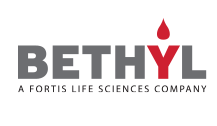Rabbit anti-Human Kappa Light Chain Antibody Affinity Purified

Product Details
Specifications
Request Formulation Change Serum containing 0.09% Sodium Azide
Request Formulation Change
By immunoelectrophoresis and ELISA this antibody reacts specifically with kappa light chains common to all human immunoglobulins. No antibody was detected against lambda light chain or non-immunoglobulin serum proteins. This antibody may cross react with kappa light chain from other species. Antiserum was solid phase adsorbed to ensure specificity.
By immunoelectrophoresis this antibody reacts specifically with kappa light chains common to all human immunoglobulins. No antibody was detected against lambda light chain or non-immunoglobulin serum proteins. This antibody may cross react with kappa light chain from other species.
Additional Product Information
The kappa light chain is a component of an Ig molecule that typically forms an Ig molecule linking to a heavy chain. The human body makes both kappa and lambda light chains, and elevated kappa levels may suggest disorders such as amyloidosis or multiple myeloma.
Applications
Not all listed applications have been specifically tested by our laboratory.
For use in precipitin gel reactions (e.g. immunoelectrophoresis (IEP) or double diffusion Ouchterlony (DD)).
Optimal working dilutions should be determined experimentally by the investigator.
